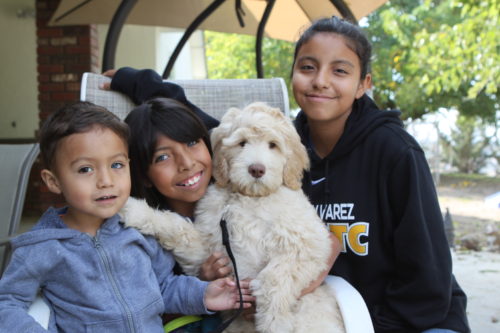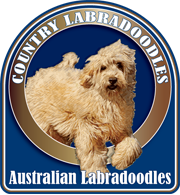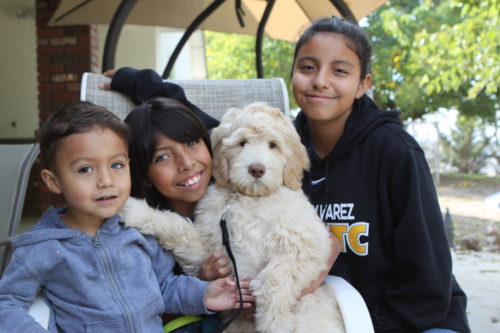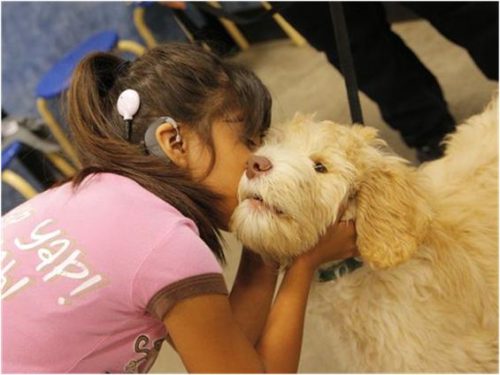JOIN US & HELP RAISE FUNDS FOR BUDDY TO BE A HEARING ALERT DOG FOR CATALINA
Buddy has gone home and started his training to be a hearing alert dog for Catalina. We knew that this puppy was special from a very early age. He has all the intuition, focus and a bit of an edge that will make him a great hearing alert dog for Catalina. Please visit the link above and learn more about how you can help. We are very proud to be able to make a difference with our dogs.

BUDDY
Salinas family raises funds for hearing service dog
Chelcey Adami , The Californian 9:52 a.m. PST November 23, 2016
(Photos: Provided by Burgoa family)
With the help of family, friends and strangers, a fluffy cream-colored four-legged friend will help bring safety to a sometimes silent world for one little Salinas girl.
Ten-year-old Catalina Burgoa’s parents realized she was deaf a few days after she was born, and to help her hear, she now wears cochlear implants, an electronic device that sends signals to a part surgically placed under her scalp.
Yet when she takes them off to sleep, shower, swim, or just to rest her ears, she is once again deaf. There are also times when the batteries of the implants fail or die.
With this in mind, her family worries about her safety, always wanting to watch over her but realizing that it’s impossible to always be there.
The recent death of Salinas 17-year-old Gabriela “Gabby” Beas, who was fatally struck by a speeding motorcycle in October, also hit home. Beas was reportedly deaf in one ear and may have not had a chance to hear or see the approaching motorcycle that struck and killed her.
Catalina’s older sister, Abril, 15, had met Beas through friends and was shook up by the loss.
Catalina’s family began exploring the possibility of getting her a hearing service dog but found that they can cost between $35,000 and $40,000, a daunting cost for the family that relies on one income. It also involves a lengthy waiting list, and most agencies that provide service dogs for the deaf prioritize adults as recipients, said Catalina’s mother, Linda.
Linda lost her job working in produce years ago when there was an E. Coli scare in the area, and she has since focused on helping to care for Catalina, Abril and their young son, Yeshua, as they grow up in their east Salinas home. Her husband, Ivan, works in construction, and when Linda lost her job, the family lost the insurance which they had from her job. The insurance had covered the hearing aids but not the cochlear implants, which had cost thousands of dollars.
In hopes of cutting down the expense for the service dog, they decided to instead get a dog and then get it the specialized training themselves. It was much cheaper route but still expensive. Seeing her parents struggle with finding funds to cover the costly venture, Abril came up with the idea to fundraise online to get the $10,000 needed to cover the puppy’s cost and training.
Linda found that the Australian Labradoodle is a breed suitable for this type of training.
“They said that was a really smart dog so what I started doing was looking at breeders nearby who were close to us, and I wrote to many of them to see if they were willing to donate a dog or maybe reduce a price,” Linda said.
The road to a bright spot like “Buddy” has been bumpy. Catalina was unable to hear her parents’ voices until she was 17 months old after she had her first cochlear implant.
“The first time she was able to hear our voices, her face lit up and her amazing blue eyes were wide open … It was something amazing,” Linda said. “Her expression was happy, scared. It was kind of overwhelming in the beginning for her.”
In 2011, Catalina and Abril were playing on a swing when Catalina fell and hit her head on her right side. The fall caused the internal antenna of the implant to stop working, and for two months, she was deaf again.
The return to silence was very difficult for Catalina and her family.
“She was scared all the time,” Linda said. “She was crying and attached to me because she needed that security. She knew somebody would be talking to her and we needed to let her know what’s going on because she’s not hearing at all.”
“I always had to be careful with her and was scared of doing the wrong thing,” Abril said. “I felt like I had to take care of her because she’s my little sister, and I’m supposed to take care and make sure nothing happens to her.”
Abril blames herself for Catalina’s accident, still tearing up just thinking about it as her sister wraps her arms around her big sister.
After the second cochlear implant. Catalina still perceives sound differently, and each ear has a varied level of strengthen in hearing. It’s also tough for her to hear in noisy environments.
Catalina, 10, works with “Buddy” during a dog training class on Monday night. (Photo: Chelcey Adami)
At school, she struggles with processing information. This makes the primarily auditory learning process difficult and frustrating for her.
“We were told her brain is wired kind of differently,” Linda said. “Her processing memory or hearing memory is not good. For example, if something is read out loud to her and then you question her, she doesn’t remember … The education system is not for visual learners. The education system is for auditory, oral or hands-on learners.”
Catalina’s parents have been told that she’ll always be behind and won’t go to a university due to her learning disability, yet her parents are still researching ways to help her find a learning system that works for her.
“Although Cata has been through a lot, she is still a happy girl,” Linda said.
While doctors said she wouldn’t be able to appreciate music, Catalina adores listening to music and can often be caught singing and dancing to music, her family said. She also loves animals and wants to be a veterinarian one day.
Catalina often surfs online, curious to find other deaf people who can identify with the world as she hears it. She sends her family the links.
As of Tuesday afternoon, the “Catalina’s Hearing Dog” Go Fund Me page had received a total of $5,800 in donations, just $4,200 shy of its $10,000 goal to finish paying for Buddy’s specialized training.
The family has been incredulous at the generosity of strangers.
“We’re very grateful for everyone who has helped us and want to say ‘Thank you,’” Ivan said. “The fact that they’re sharing it on Facebook, it means a lot.”
Abril said she initially didn’t believe anyone would donate at all, thinking, “Why even try? This is dumb,” but was soon excited to see all the support.
“I like this is the real representation of when life gives you lemons, you make lemonade,” she said.



